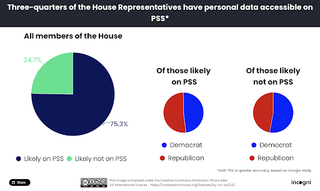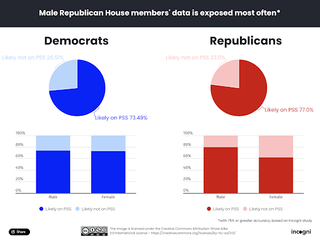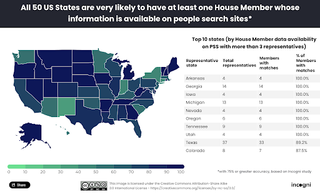These House of Representatives members are at the highest risk of being exposed online
Their private information isn't so private

Three-quarters of members of the House of Representatives have had their personal data exposed online, according to research.
The research, which was conducted by data removal service Incogni found that 75% of House members have personal data publicly available on people search sites (PSS), meaning their home addresses, phone numbers and even contact details for their relatives are freely available.

Who is the most at risk?
While every US state has a representative whose data has been exposed on PSS, there are some demographics within Congress that are more likely to have had their data exposed.
The members of Congress most at risk of having their data exposed, according to Incogni's research, are male Republicans. Nearly 80% of Republican representatives have been found on PSS', exposing their personal information. Female Republicans are less likely, with 62% having their data exposed. For male Democrats, 74% had their data exposed on PSS.

This puts these representatives particularly at risk from both cybersecurity and real-world threats. It may also potentially damage their reputations as members of government should be more careful with their security and privacy, especially given the nature of their job.

House members from Arkansas, Georgia, Iowa, Michigan, Nevada, Oregon, Tennessee, and Utah had a 75% or more probability of having their data exposed on PSS, whereas House members from Connecticut, New York, Indiana, Minnesota, Washington, Arizona, and South Carolina were the least likely to have their data exposed. Less than 60% of representatives from these states had their personal information on such sites.
Learn more about the research by reading Incogni's blog post.
Sign up to get the BEST of Tom's Guide direct to your inbox.
Get instant access to breaking news, the hottest reviews, great deals and helpful tips.
What are people search sites?
People search sites are specialized data brokers which collect, store and sell personal information. Often people are unaware that their data is available on PSS, which is especially troubling considering PSS collect and sell data including property records, home addresses and phone numbers.
The data collected and sold by PSS can be harmful when in the wrong hands, whether this is through harassment or via targeted cyber attacks like phishing campaigns. This is why it's concerning that so many members of US Congress' data is available on these sites, especially with the recent assassination attempt against former president Donald Trump, and the violent threats made against Democrat presidential candidate Kamala Harris.
Darius Belejevas, data privacy expert and head of Incogni said of the research: “The safety of US lawmakers has rarely felt so precarious, so it was frightening to uncover how much of their personal data is easily obtainable.
"This is a massive oversight that exposes House Members to security risks and needs to be urgently addressed.
"This isn’t just an issue affecting high-profile politicians, though. Millions of Americans can be found on people search sites and their data can be exploited by fraudsters and identity thieves or sold to unknown entities for purposes they haven’t consented to.”
This isn't the first time that governments have been exposed for having poor cybersecurity and data hygiene practices. In fact, in May of this year research by the creators of one of the best VPN services, Proton, revealed that almost 80% of UK MPs sitting at the time had had their personal data leaked online. Clearly, the world's governments need to take more care.

Olivia joined Tom's Guide in October 2023 as part of the core Future Tech Software team, and is the Commissioning Editor for Tech Software. With a background in cybersecurity, Olivia stays up-to-date with all things cyber and creates content across TechRadar Pro, TechRadar and Tom’s Guide. She is particularly interested in threat intelligence, detection and response, data security, fraud prevention and the ever-evolving threat landscape.